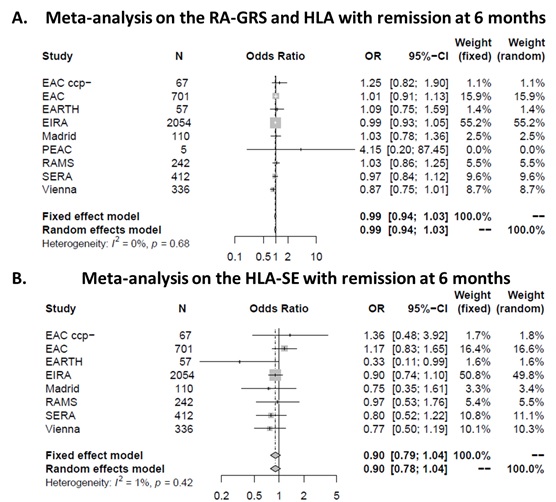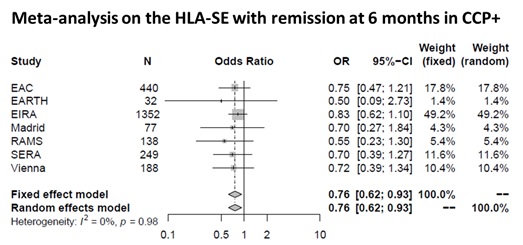Session Information
Session Type: Poster Session B
Session Time: 8:30AM-10:30AM
Background/Purpose: Rheumatoid Arthritis (RA) patients capable of reaching clinical remission potentially have a specific genetic profile that allows them to regain immune tolerance. The identification of these genes could provide insights into the etiology of RA, as well as immunological pathways which could serve as novel drug targets.
We set out to test the association between established RA genetic risk variants and achieving remission at 6 months.
Methods: We computed genetic risk scores (GRS) comprised of RA susceptibility variants1 and HLA-shared epitope (SE) allele status separately in 3,984 DMARD naïve patients across 9 datasets from inception cohorts. Remission was assessed at 6 months and defined as DAS28CRP values below 2.6. Values were imputed where necessary using predictive mean matching by MICE. We first tested whether baseline DAS28CRP changed with increasing GRS using linear regression. Next, we used logistic regression to determine the relationship between the GRS and HLA-SE alleles and 6 month DAS28CRP remission in all cohorts independently. Using inverse variance weighted meta-analysis we concatenated these results into a singular effect estimate.
Due to the known differences in genetic background of anti-CCP positive and negative RA, we also repeated the analyses in only anti-CCP positive patients.
Results: Baseline clinical variables did not differ between patients who achieved remission and those who did not (Table 1). Distribution of the GRS was consistent between datasets. Neither GRS nor HLA-SE alleles were associated with baseline DAS28CRP (OR 1.01; 95% CI 0.99 – 1.04). A fixed effect meta-analysis showed no significant effect of the GRS (OR 0.99; 95% CI 0.94 – 1.03) or HLA-SE alleles (OR 0.90; 95% CI 0.79 – 1.04) on remission at 6 months (Figure 1). In the seropositive analyses we did observe one significant association; HLA-SE alleles positivity reduced the likelihood of 6 months DAS28CRP remission in the anti-CCP positive stratum (OR 0.79; 95% CI 0.62 – 93) (Figure 2).
Conclusion: Of the known RA genetic risk variants only HLA-SE alleles are associated with a decreased chance of obtaining remission in the anti-CCP positive population in these combined cohorts. Studies encompassing broader genetic profiles are needed to further elucidate the genetics of RA remission.
References:
1). Knevel R et al. Sci Transl Med. 2020;12(545):eaay1548.
To cite this abstract in AMA style:
Maurits M, Jurado Zapata S, Abraham Y, van den Akker E, Barton A, Brown P, Cope A, Gonzalez-Alvaro I, Goodyear C, van der Helm-van Mil A, Hu X, Huizinga T, Johannesson M, Klareskog L, Lendrem D, McInnes I, Morton F, Paterson C, Porter D, Pratt A, Rodriguez Rodriguez L, Sieghart D, Studenic P, Verstappen S, Padyukov L, Winkler A, Isaacs J, Knevel R. Genetics of Rheumatoid Arthritis Remission; HLA-SE Associated with Remission in Anti-CCP Positive Patients [abstract]. Arthritis Rheumatol. 2021; 73 (suppl 9). https://acrabstracts.org/abstract/genetics-of-rheumatoid-arthritis-remission-hla-se-associated-with-remission-in-anti-ccp-positive-patients/. Accessed .« Back to ACR Convergence 2021
ACR Meeting Abstracts - https://acrabstracts.org/abstract/genetics-of-rheumatoid-arthritis-remission-hla-se-associated-with-remission-in-anti-ccp-positive-patients/



